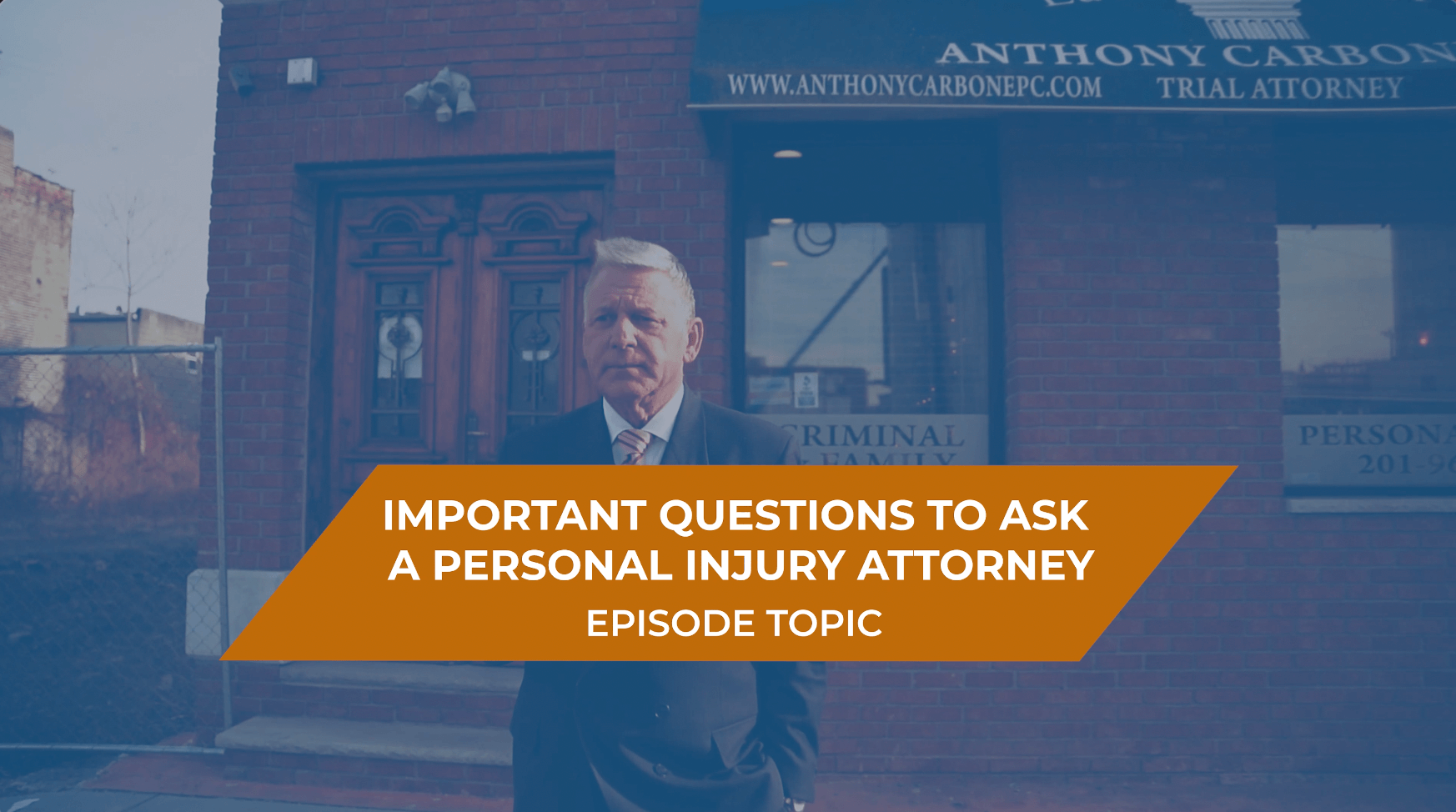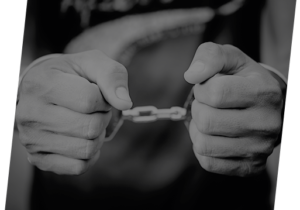
Get An Attorney Fast
When you are facing criminal charges in Jersey City, you need legal representation immediately. The longer you wait, the situation could become dire.
 Jersey City criminal defense attorney Anthony Carbone has been defending clients in criminal courts across New Jersey for his entire career. He will guide you through the legal process, tell you what your legal options are, and help you choose the best outcome based on your case. With his three decades worth of experience, Attorney Carbone can quickly determine what steps to take. He might be able to arrange for a plea bargain or complete dismissal of charges.
Jersey City criminal defense attorney Anthony Carbone has been defending clients in criminal courts across New Jersey for his entire career. He will guide you through the legal process, tell you what your legal options are, and help you choose the best outcome based on your case. With his three decades worth of experience, Attorney Carbone can quickly determine what steps to take. He might be able to arrange for a plea bargain or complete dismissal of charges.
Our criminal defense lawyer will find flaws in the prosecutor’s case and suggest defense strategies that will lead to a favorable outcome. And if you ever need to erase your criminal record further down the line, he can assist you with that process. If you are facing a criminal law charge and are in need of a Jersey City criminal defense attorney, contact the Law Offices of Anthony Carbone immediately to schedule an initial consultation about your case.
Criminal Charges in New Jersey
Unlike other states, New Jersey classifies criminal offenses into two categories:
- Indictable crimes – Similar to felony charges, an indictable crime holds a punishment of at least one year in prison.
- Disorderly or petty disorderly person offenses – The punishment for these crimes are not as severe and are similar to misdemeanors.
Within each offense, New Jersey then selects one of four degrees of severity of the crime. For example, if you are facing a first-degree indictable offense, you could face up to 20 years in prison plus various fines. However, for a charge of shoplifting, you may be only facing a fourth-degree disorderly person offense which could be just a fine.
No matter what type of crime you have been charged with, you need to seek legal help right away. Even a misdemeanor crime will go on your criminal record and make life difficult. You may face fines, jail time, probation, and more.
When you have been charged with a crime, contact the Law Offices of Anthony Carbone as soon as possible to protect your legal rights. He understands the workings of the criminal courts and civil trial courts in Hudson County. This familiarity with the court system makes him an effective advocate in all proceedings and negotiations. He represents clients in Union City, Hoboken, Newark, and throughout New Jersey.
Disorderly Person Offenses
 The Municipal Court system handles a disorderly persons offense, and you are not entitled to a jury trial. Depending on the severity of your crime, you will face either a petty or a regular disorderly persons offense. For example, you could face a petty disorderly persons offense for writing a bad check.
The Municipal Court system handles a disorderly persons offense, and you are not entitled to a jury trial. Depending on the severity of your crime, you will face either a petty or a regular disorderly persons offense. For example, you could face a petty disorderly persons offense for writing a bad check.
Some of the more severe offenses include:
- Property theft for less than $200 in damages or loss
- Criminal mischief for less than $200 in damages or loss
- Simple assault
- Shoplifting of an item that is less than $200
- Possession of fewer than 50 grams of marijuana
The typical sentence for one of these offenses is a stiff fine of up to $1,000 and six months in jail. You may also have to do community service, pay court costs, and other types of penalties. Also, the court could give you probation and may even suspend or revoke your driver’s license for up to two years.
Indictable Crimes
An indictable person offense generally carries a punishment of at least one year in prison. These crimes are further classified by degrees, depending on the severity of your crime:
- First-degree, such as murder, manslaughter, and rape
- Second-degree, such as sex offenses, burglary, white-collar crimes, and drug crimes
- Third-degree, such as arson and some robbery offenses
- Fourth-degree, such as stalking and forgery
For example, a burglary charge is a second-degree indictable crime. You will face a punishment of up to 10 years in prison and a $15,000 fine.
DUI/DWI
If your blood alcohol content is 0.08% or higher while operating a motor vehicle or a boat, you will be facing a drunk driving charge. Even with a first offense, you may get a punishment of up to 30 days in prison, receive up to 5 points on your license, and owe thousands in legal fees. Not only are you facing jail time, license suspension, high fines, and surcharges, but you can also receive higher insurance rates and possibly an ignition interlock on your car.
Under state law, plea bargains are not allowed in DWI cases. Your lawyer must get charges thrown out or win your case at trial.
Juvenile Criminal Defense
Although most juvenile criminal cases head to family court, there are times that the crime is severe enough that it makes its way to Superior Court. Your child will face charges as an adult and will face stronger punishment.
As an experienced criminal defense attorney, Attorney Carbone will not let this happen. All charges against your child should be taken seriously and not something that should handle on your own. You need an experienced defender by your side to get the right results.
Domestic Violence Claims
What many people don’t realize is in New Jersey, a domestic violence charge is handled by the family court system instead of the criminal courts. Not many criminal lawyers in New Jersey know the ins and outs of family court which can easily be detrimental to your case. However, Attorney Carbone has worked in New Jersey family law and has the understanding needed to help you with your situation.
Common Legal Defenses
If you have been accused of a crime, not all is lost. Jersey City criminal defense lawyer Anthony Carbone can gather evidence to help defend your case. There are many legal defenses that can be used to prove that you did not commit the crime. They include the following:
- Innocence. One of the simplest defenses to criminal liability is innocence. If you did not commit the crime, then the prosecution has to prove beyond a reasonable doubt that you did do it. However, many innocent people still end up in jail, so any evidence you have will be important.
- Alibi. Were you somewhere else when the crime happened? If so, you need to present an alibi defense. This means you must prove that you were somewhere other than the scene of the crime at the time of the crime. This may include witness testimony, surveillance footage, receipts (such as from a restaurant, store, movie theater, sporting event), or phone records.
- Constitutional violations. Police often make mistakes in how they do their job. Constitutional violations are types of criminal defenses used to show that the way evidence was collected by police and other law enforcement was in violation of the law. They include illegal search and seizure, obtaining an improper confession, failure to obtain a warrant for entry, or failure to read the Miranda Rights at the time of the arrest. Using these defenses correctly could result in the dismissal of the entire case, so don’t overlook them.
- Self-defense. Self-defense may be raised for crimes like assault, battery, and murder, where you may have used violence in a justified way to respond to the violent actions of the other person. However, the amount of force you used must have been reasonable and proportionate to the amount of force used by the victim.
- Defense of others. This is a similar defense, in which you can claim the violence was justified in order to protect others. This may be used in cases in which you defended a spouse, a child, or another family member from getting attacked.
- Mistake of fact. This occurs when you make a mistake and are charged with a crime. This may occur, for example, when you are charged with stealing a car, but you were under the impression that your family member wanted to give you the car. This defense is useful in embezzlement or fraud cases. If you thought you were given the authority to use the person’s money or other property, then you may be able to claim mistake of fact.
- Duress or coercion. If someone threatened you to do something you did not want to do, you may be able to claim duress or coercion. This basically means you were forced to commit a crime. Mafias and cults will use coercion to entangle people in their criminal activities by threatening to harm them or their families.
- Entrapment. Entrapment is another type of coercion, but this is done by police officers. To use entrapment as a defense, the burden is on you to prove that a law enforcement officer induced or encouraged you to commit a crime, and as result, you were charged with an offense. The police conduct must have caused you to commit the crime, so the crime was a direct result of the police action.
- Necessity. This defense applies if you committed a crime to prevent a more significant harm from happening. Examples would be stealing a car to drive a gunshot victim to the hospital or stealing food to feed a starving family.
- Consent. Consent refers to a situation where the victim agrees to the conduct or allows it to occur. Under New Jersey law, in the case of bodily harm, a consent defense can only be used in three instances:
- The bodily harm was not serious.
- The bodily harm was a foreseeable hazard in participating in a legal activity.
- The consent establishes a justification for bodily harm that results from medical treatment.
- Abandonment or withdrawal. This defense can be raised when a defendant initially intended to commit a crime but changed their mind. For most crimes, you can prove that you successfully abandoned or withdrew from a crime by showing you stopped participating in the crime before it was committed.
- Insanity. The insanity defense means that you must prove that you were suffering a severe mental disease at the time the crime was committed. It also means that you were unable to distinguish right from wrong when the crime was committed or you had an irresistible impulse to commit a crime, meaning that you were unable to stop doing it. You may have heard about the insanity defense, but the truth is that it’s not used all that often. That’s because it requires you to admit that you committed the crime. This is a risky move because if the jury does not agree that you are insane, too many facts have been admitted, and this gives the prosecution an easy win. Also, a successful insanity defense generally results in institutionalization.
Contact Our Jersey City Criminal Defense Attorney Now
 Facing a New Jersey courtroom alone without a criminal defense attorney present may lead to a devastating outcome. That’s why your first phone call should be to Jersey City criminal defense lawyer Anthony Carbone. For 30 years, our Jersey City criminal lawyer has been fighting for the rights of his clients throughout New Jersey. He is sympathetic to your situation and is ready to fight for your rights in the courtroom. No matter what you did, you have the right to have your voice heard and had an aggressive legal representative by your side.
Facing a New Jersey courtroom alone without a criminal defense attorney present may lead to a devastating outcome. That’s why your first phone call should be to Jersey City criminal defense lawyer Anthony Carbone. For 30 years, our Jersey City criminal lawyer has been fighting for the rights of his clients throughout New Jersey. He is sympathetic to your situation and is ready to fight for your rights in the courtroom. No matter what you did, you have the right to have your voice heard and had an aggressive legal representative by your side.
Now is not the time to wait — it’s time for action. If you are facing either disorderly persons or indictable crime in the Garden State, contact the Law Offices of Anthony Carbone immediately to schedule an initial consultation about your case. Now serving clients in Hudson, Essex, Passaic, Union Counties, and throughout New Jersey. Call us at 201-829-3829.
If you’re interested in learning more about your criminal charges, check out our New Jersey Statutes section.
Areas We Practice Criminal Defense Law:



